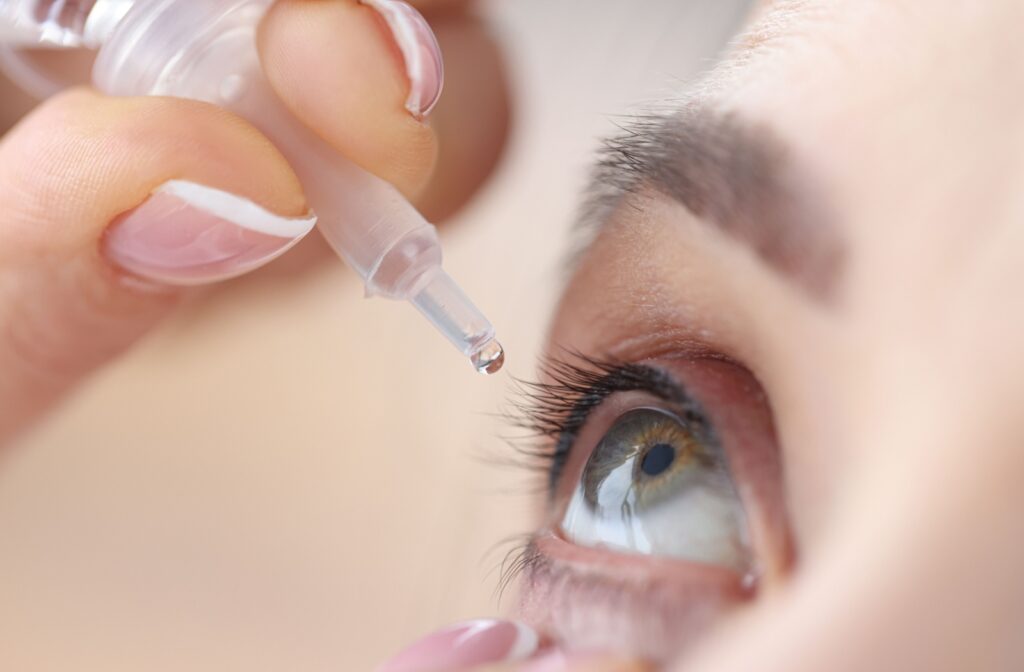Dry eyes can be incredibly uncomfortable, making your eyes feel scratchy, irritated, and fatigued. Many of those who experience dry eyes might notice symptoms such as stinging, burning sensations, blurred vision, light sensitivity, or even difficulty wearing contact lenses.
The symptoms of dry eye can disrupt daily tasks like reading, driving, or staring at a computer screen. While factors such as aging, prolonged screen use, and environmental conditions often contribute to dry eyes, your diet may also play a significant role in eye health.
One important tool in combating dry eyes is making sure your body gets the nutrients it needs. Vitamins and other essential nutrients not only enhance your overall health but also support the health of your eyes.
The key vitamins for dry eyes are:
- Vitamin A – Essential for maintaining the health of the cornea and ensuring proper tear production.
- Vitamin D – Helps reduce inflammation and supports tear stability.
- Omega-3 Fatty Acids – Improves tear quality by preventing them from evaporating too quickly.
- Vitamin E – Acts as an antioxidant, protecting tear glands from damage and promoting lubrication.
At The Eye Gallery, we are dedicated to your eye health; let’s start with an eye exam to determine the best plan for you!
What Causes Dry Eyes?
Before looking at the solutions, it’s helpful to understand the causes of dry eyes. Dry eyes occur when your eyes don’t produce enough tears, or the tears evaporate too quickly. This can happen due to several reasons, such as:
- Aging (especially in people over 50)
- Hormonal changes, particularly during menopause
- Spending long hours in front of screens without blinking enough
- Certain medications, including antihistamines and antidepressants
- Environmental factors like wind, smoke, or low humidity
- Health conditions like diabetes or autoimmune diseases
While lifestyle adjustments like reducing screen time and using proper hydration can help, getting the right vitamins can also significantly reduce symptoms of dryness, discomfort, and inflammation in the eyes.
Vitamins That Can Help Combat Dry Eyes
Vitamin A
Vitamin A is one of the most important nutrients for eye health. It is crucial for maintaining the surface of your eyes–the cornea. A deficiency in Vitamin A can lead to keratoconjunctivitis sicca, one of the most common forms of dry eye. Vitamin A promotes mucous production, which contributes to tear stability. This helps ensure your eyes stay lubricated and protected.
Sources of Vitamin A: Carrots, sweet potatoes, spinach, kale, and liver are all excellent sources of Vitamin A. For those who prefer a supplement, look for retinol or beta-carotene options, though you should consult your doctor beforehand to ensure the right dosage for your needs.
Vitamin D
Known as the “sunshine vitamin,” Vitamin D may help improve symptoms of dry eyes by reducing inflammation. Research suggests that individuals with low levels of Vitamin D are more likely to experience dry eye symptoms than those with adequate levels. Its anti-inflammatory properties can enhance tear stability and reduce discomfort caused by dry eyes.
Sources of Vitamin D: Natural sunlight is one of the best ways to boost Vitamin D levels. However, food sources like fatty fish (salmon, mackerel, and tuna), fortified dairy products, and eggs are also excellent options. If you’re considering a Vitamin D supplement, choose Vitamin D3, as it is considered the most effective form.
Omega-3 Fatty Acids
Technically not a vitamin but a vital nutrient, Omega-3 fatty acids are often hailed as a game-changer for dry eye relief. Omega-3s help improve the quality of the tear film by encouraging the production of oily layers in tears, which prevents them from evaporating too quickly.
Sources of Omega-3 Fatty Acids: Fatty fish such as salmon, mackerel, and sardines are rich sources of Omega-3. For those who don’t consume fish, flaxseeds, chia seeds, walnuts, and algae-based Omega-3 supplements are great options.
Vitamin E
Vitamin E plays an antioxidant role, protecting your eyes from oxidative stress caused by environmental factors like sunlight exposure or pollution. This can have a protective effect on the tear glands, ensuring your eyes have consistent lubrication. Additionally, combining Vitamin E with Omega-3s has been shown to bring about even better results when managing dry eye conditions.
Sources of Vitamin E: Nuts and seeds like almonds, sunflower seeds, and hazelnuts, as well as green leafy vegetables such as spinach, are rich in Vitamin E. Fortified cereals and cooking oils like sunflower, safflower, or wheat germ oil are other valuable sources.
The Role of Eye Drops in Managing Dry Eye
Eye drops offer quick relief for dry eye symptoms by hydrating and soothing irritation. Preservative-free options are ideal for avoiding additional irritation, and lipid-based drops can help stabilize the tear film. Paired with a diet rich in vitamins A, D, Omega-3, and E, eye drops complement long-term strategies to maintain clear, comfortable vision. For tailored solutions, consult an eye care professional like The Eye Gallery.

How to Get These Vitamins into Your Daily Diet
- Eat a Balanced Diet: Incorporate a variety of foods like leafy greens, colorful vegetables, cold-water fish, nuts, and seeds into your meals to ensure you’re hitting all the essential nutrients.
- Consider Supplements: If your diet alone doesn’t provide enough of these nutrients, talk to your doctor or optometrist about taking supplements. For example, Omega-3 fish oil capsules or Vitamin D soft gels can be easy additions to your routine.
- Be Mindful of Portions: Consuming excess amounts of certain vitamins, like Vitamin A, can be harmful. Always stick to recommended daily allowances and consult healthcare providers when adding new supplements.
- Stay Hydrated: Vitamins work best when your body is properly hydrated. Drinking plenty of water aids tear production and improves eye health.
Brighten Your Vision with the Right Nutrients for Dry Eye Relief
Dry eyes may be a frustrating condition, but taking a proactive approach with the right vitamins can provide relief. Whether it’s Vitamin A supporting the cornea, Vitamin D reducing inflammation, Omega-3 fatty acids boosting tear quality, or Vitamin E protecting against oxidative stress, incorporating these into your daily diet can improve your eye health over time.
Pairing a well-rounded diet with other strategies like using humidifiers, taking screen breaks, and practicing good eye hygiene can help reduce dry eye symptoms even further. If you’re still experiencing discomfort despite these efforts, consider consulting an eye care specialist for a personalized treatment plan.
Don’t let dry eyes or vision concerns impact your daily life. At The Eye Gallery, our team is here to provide personalized care tailored to your needs. Whether you’re seeking relief from dry eyes or need a comprehensive eye exam, we’ve got you covered with advanced treatment options and top-notch service in a warm, welcoming environment. Book your appointment today and take the first step toward healthier, more comfortable eyes. Your vision deserves the best.




